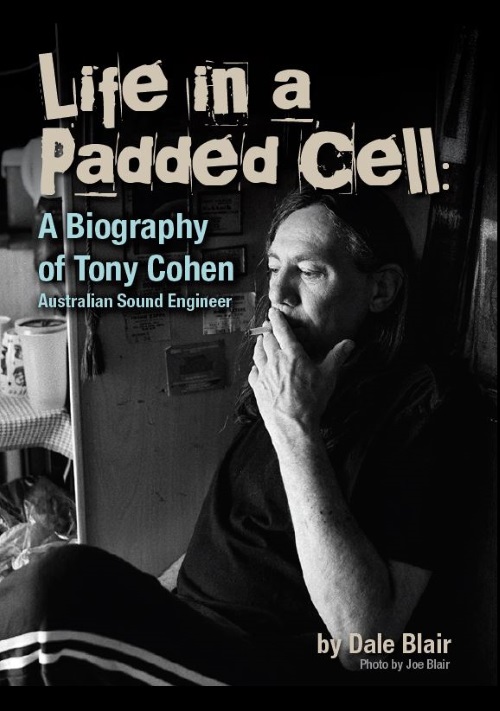Legendary Australian sound engineer and producer Tony Cohen passed away peacefully in his sleep last week at the Dandenong and District Hospital. He was sixty years of age.
Tony has left behind a remarkable legacy of Australian sound through the bands he worked with over a career spanning five decades. His list of credits reads as a pantheon of the Australian music scene. While he dealt with mainstream acts he found his niche in the independent music scene that exploded in the late 1970s.
Tony began his career after a two-week work experience stint at Armstrong’s studios in South Melbourne. At the end of the fortnight he simply continued to work instead of returning to school.
At Armstrong’s Tony fell under the tutelage of Molly Meldrum and with Molly achieved early gold record success as a nineteen year old engineer with the band Supernaut’s I Like It Both Ways and a year later with the Ferrets Dreams Of A Love album. Tony became friends with The Ferrets and toured as their sound engineer which was an unprecedented thing at the time.
Life on the road saw Tony drift away from Armstrong’s and he became ensconced at Richmond Recorders where he became something of a mad professor within the four walls of that musical asylum. It was at Richmond between 1978-1983 that he met and worked with bands such as The Boys Next Door, The Models, The Go-Betweens, The Laughing Clowns, The Dots, Hunters & Collectors, The Reels and The Dynamic Hepnotics, bands and artists that would illuminate Australia’s musical landscape.
It was Tony’s generosity in giving time to not only those bands but numerous others that passed through the doors of Richmond Recorders alongside his willingness to experiment that made him such a vital figure in the Melbourne music scene particularly.
Tony moved to Sydney for a short time in 1983 and as the eighties progressed the bands that came into his orbit continued to grow. The Sacred Cowboys. The Johnnys and The Beasts of Bourbons were three from which enduring productive artistic associations were formed with the likes of Spencer P. Jones, Kim Salmon, Charlie Owen and Tex Perkins.
By the mid-eighties Tony had begun to develop a firm working relationship with The Birthday Party and then Nick Cave and The Bad Seeds. In 1986 he moved to London and then later to Berlin. He toured Europe and the United States during this time with The Bad Seeds as well as working on half a dozen of their albums.
Drugs which had been a constant in Tony’s life took a serious hold and in 1988 he returned to Australia in ill health and retreated to his parents’ home in Kongwak. Here he spent a few years in relative seclusion until 1991 when he reconnected with Tex Perkins and began working with the Cruel Sea. This was the beginning of a new purple patch in Tony’s career.
The period between 1991-1996 was a frenetic time and a slew of great artists came Tony’s way, Grant McLennan, Robert Forster, Paul Kelly, Maurice Frawley and Dave Graney among them. Simply put his genius was a sought after commodity. It was during this time that he won three Aria awards, for best producer (twice) and best engineer. His work on The Cruel Sea’s The Honeymoon Is Over album is perhaps the most enduring of his works and was certainly the one of which he was most proud.
From 2002 Tony lapsed into a state of semi-retirement. His health had become a major concern and simply did not allow him to spend the protracted hours at a mixing desk that was needed and that he had been able to do in days gone by.
I was fortunate to get to know Tony quite well over the past few years and his black humour and generosity were always on show. The world amused him and his hearty laugh rings in my head as clear as a bell. He was no angel and previous drug induced behaviours sometimes hurt those close to him. He was remorseful of that yet he owned his addictions and knew that advanced age was not something that would be his to enjoy. He expressed no regrets about his lifestyle saying that it had allowed him to travel to places he would otherwise have not seen and to work with an array of extraordinary artists.
Tex Perkins once called Tony an ‘evil genius’. It was a mischievous evil not a malevolent one as Tony was as gentle a soul as one could find. By Tony’s own admission he was not a technical maestro. His genius was intuitive and he will be missed by all who worked with him, by all who were influenced by him and by all who were lucky enough to call him a friend.
In a recent tribute Nick Cave referred to Tony as a ‘national treasure’ and I can think of no better appellation given the extensive list of credits next to his name. He undoubtedly shaped Australian musical sounds for two decades and when at his peak had no peer. One hopes that the music industry will make appropriate acknowledgement.
Tony is survived by his wife Astrid Munday, his mother Margaret and his brother Martin.


